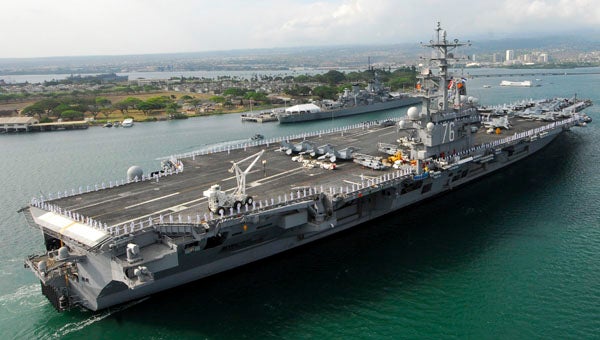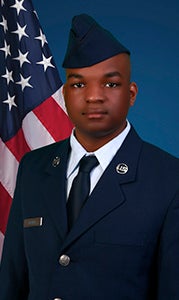This week in military history
Published 9:34 pm Monday, July 11, 2011

U.S. Navy sailors and Marines man the rails aboard the aircraft carrier USS Ronald Reagan as it passes the USS Missouri and USS Arizona memorials in Pearl Harbor, June 28, 2010.
Carrier Commissioned
July 11
- 1945 — Napalm was used for the first time on Luzon, as Americans forces dropped thousands of napalm bombs on Japanese soldiers holed up in the Sierra Madre.
- 1953 — Flying an F-86 Sabre, Lt. Col. John F. Bolt became the 37th Korean War ace and the only U.S. Marine Corps pilot to qualify as an ace during the Korea War. He is the only jet ace in Marine Corps history and the only U.S. Marine to become an ace in two wars (World War II and Korea).
- 1995 — Twenty years after the fall of Saigon, President Bill Clinton established full diplomatic relations with Vietnam, saying the Vietnamese had helped account for 2,238 Americans still listed as missing in the Vietnam War. During the previous year, Clinton had lifted a 19-year-old trade embargo against the nation, and in 1995, he established diplomatic relations. Republican Sen. John McCain of Arizona, who had spent five years as a prisoner of war in Hanoi during the Vietnam War, advised the president on his decision. In May of the following year, Clinton would nominate Florida Rep. Douglas “Pete” Peterson to become the first ambassador to Vietnam since Graham Martin was airlifted out of the country by helicopter in late April 1975.
- 1998 – Air Force Lt. Michael Blassie, a casualty of the Vietnam War, was laid to rest near his Missouri home after the positive identification of his remains, which had been enshrined at the Tomb of the Unknowns in Arlington.
July 12
- 1812 — General William Hull led U.S. forces into Canada against Britain during the War of 1812. However, Hull retreated shortly thereafter to Detroit, having been able to muster only a tenth of the volunteers President Madison had called for.
- 1862 — President Abraham Lincoln signed a law creating the congressional Medal of Honor from the Army, which would be awarded “to such noncommissioned officers and privates as shall most distinguish themselves by their gallantry in action, and other soldier-like qualities during the present insurrection.” The first U.S. Army soldiers to the honor were six members of a Union raiding party who in 1862 penetrated deep into Confederate territory to destroy bridges and railroad tracks between Chattanooga, Tenn., and Atlanta, Ga.
- 1864 — President Abraham Lincoln watched the battle unfold in person as Union forces repelled Jubal Early’s army on the outskirts of Washington.
- 1916 — The battleship USS North Carolina became the first Navy ship to carry and operate aircraft.
- 2003 — The USS Ronald Reagan, the first carrier named for a living president, was commissioned in Norfolk.
July 13
- 1950 — Lt. Gen. Walton H. Walker, commander of Eighth Army, assumed command of all ground forces in Korea.
July 14
- 1987 — Lt. Col. Oliver North concluded six days of testimony before the Iran-Contra committees.
July 15
- 1953 — U.S. Air Force Captain James Jabara, 4th Fighter-Interceptor Wing, qualified as the second and last “triple ace” of the Korean War with 15 kills. He was the second-ranking jet ace of the war.
July 16
- 1862 — In recognition of his victory at New Orleans, David Glasgow Farragut, was promoted to Rear Admiral, the first officer to hold that rank in the history of the U.S. Navy. Rear Admirals were to rank with Major Generals in the Army.
- 1915 — Battleships Ohio, Missouri and Wisconsin became the first ships from the U.S. navy to transit Panama Canal.
- 1945 — The United States conducts the first test of the atomic bomb at its research facility in Los Alamos, N.M. Dr. J. Robert Oppenheimer, who served as the project’s director, watched the test and exclaimed, “Now I am become death, destroyer of worlds.”
July 17
- 1862 — Congress passed an act establishing a lifetime pension for all members of the military who are disabled in the line of duty. The pension would vary, depending on the degree of disability incurred.
Source: http://tdiumh.blogspot.com/





